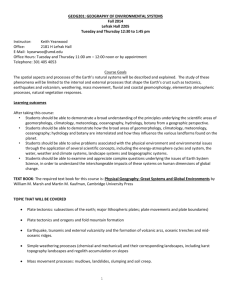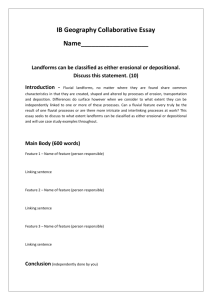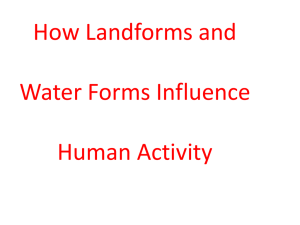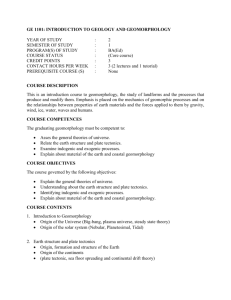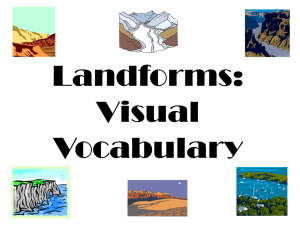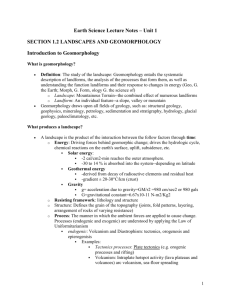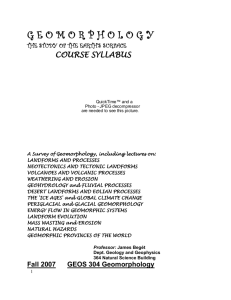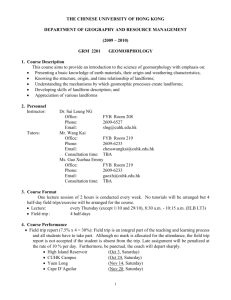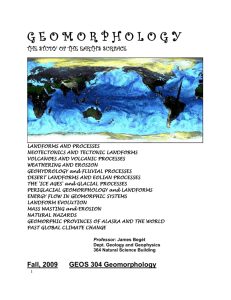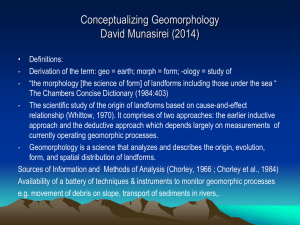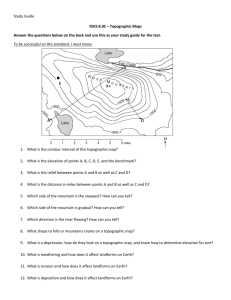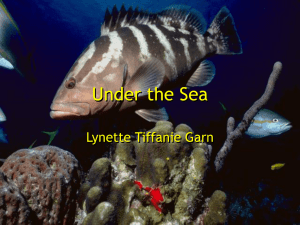Geomorphology - North Dakota State University
advertisement
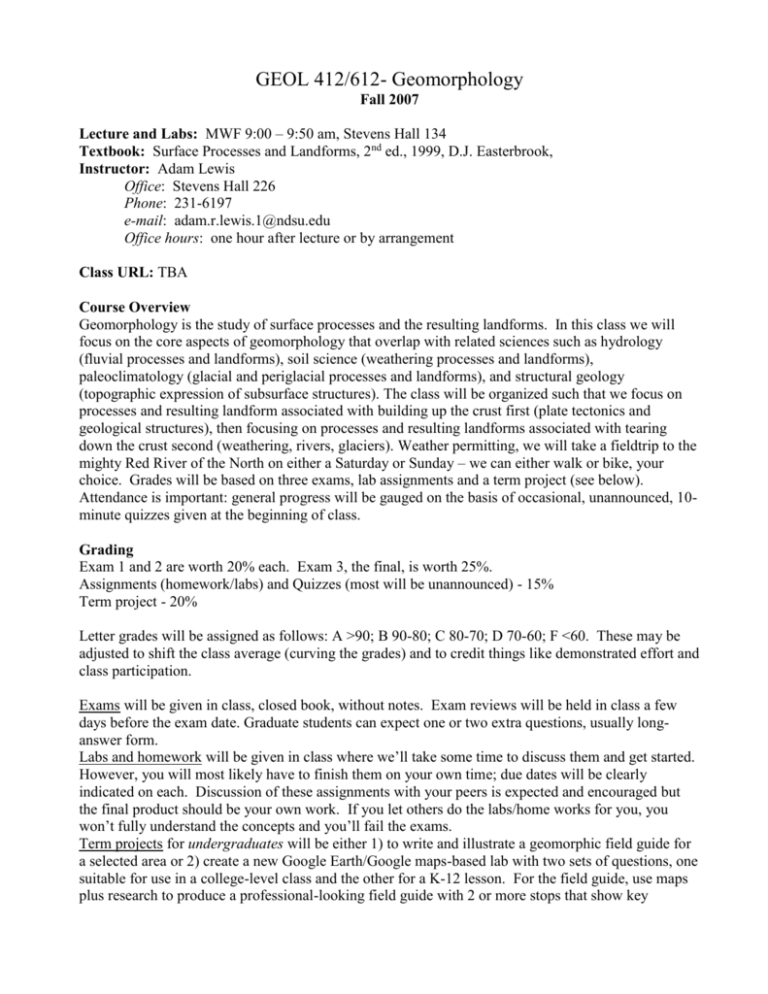
GEOL 412/612- Geomorphology Fall 2007 Lecture and Labs: MWF 9:00 – 9:50 am, Stevens Hall 134 Textbook: Surface Processes and Landforms, 2nd ed., 1999, D.J. Easterbrook, Instructor: Adam Lewis Office: Stevens Hall 226 Phone: 231-6197 e-mail: adam.r.lewis.1@ndsu.edu Office hours: one hour after lecture or by arrangement Class URL: TBA Course Overview Geomorphology is the study of surface processes and the resulting landforms. In this class we will focus on the core aspects of geomorphology that overlap with related sciences such as hydrology (fluvial processes and landforms), soil science (weathering processes and landforms), paleoclimatology (glacial and periglacial processes and landforms), and structural geology (topographic expression of subsurface structures). The class will be organized such that we focus on processes and resulting landform associated with building up the crust first (plate tectonics and geological structures), then focusing on processes and resulting landforms associated with tearing down the crust second (weathering, rivers, glaciers). Weather permitting, we will take a fieldtrip to the mighty Red River of the North on either a Saturday or Sunday – we can either walk or bike, your choice. Grades will be based on three exams, lab assignments and a term project (see below). Attendance is important: general progress will be gauged on the basis of occasional, unannounced, 10minute quizzes given at the beginning of class. Grading Exam 1 and 2 are worth 20% each. Exam 3, the final, is worth 25%. Assignments (homework/labs) and Quizzes (most will be unannounced) - 15% Term project - 20% Letter grades will be assigned as follows: A >90; B 90-80; C 80-70; D 70-60; F <60. These may be adjusted to shift the class average (curving the grades) and to credit things like demonstrated effort and class participation. Exams will be given in class, closed book, without notes. Exam reviews will be held in class a few days before the exam date. Graduate students can expect one or two extra questions, usually longanswer form. Labs and homework will be given in class where we’ll take some time to discuss them and get started. However, you will most likely have to finish them on your own time; due dates will be clearly indicated on each. Discussion of these assignments with your peers is expected and encouraged but the final product should be your own work. If you let others do the labs/home works for you, you won’t fully understand the concepts and you’ll fail the exams. Term projects for undergraduates will be either 1) to write and illustrate a geomorphic field guide for a selected area or 2) create a new Google Earth/Google maps-based lab with two sets of questions, one suitable for use in a college-level class and the other for a K-12 lesson. For the field guide, use maps plus research to produce a professional-looking field guide with 2 or more stops that show key geomorphic features (I can supply areas). At least 4 referenced sources must be paper – that means from a published source. You can get them from the internet but they must be real published documents, i.e. NOT the opinion of some unknown person on a website. If you decide to create a new lab, use the ones we’ve been doing as a guide. Select a geomorphic process and/or feature, then, find a map region that can be used as a base. Include detailed explanations with your answer key. Creativity will be rewarded. Graduate students should write a fully referenced review of the surficial geology of their study area. Same rules apply to referenced sources. Write it so that it can become a chapter in your thesis (you’ll thank me later). Americans with Disabilities Act Any students with disabilities or special needs are invited to share their concerns with the instructor as soon as possible such that reasonable accommodation(s) can be made. Academic Code of Conduct I emphasize the importance of your adherence to the North Dakota State University’s Code of Academic Responsibility and Conduct, especially those portions concerned with plagiarism and cheating. You can familiarize yourself with the details of academic conduct at www.nodak.edu/policy/335.htm. Tentative Course Schedule Date Topic 8/26 Introduction to geomorphology Start part I – Building up the crust 8/28 Mega-scale Earth landforms/plate tectonics Reading Ch 1 Ch 8 8/31 9/2 9/4 LAB 1 the Earth’s surface features Tectonic landforms Tectonic landforms Ch 8-10 Ch 8-10 9/7 9/9 9/11 Labor Day Holiday Tectonic landforms (guest lecturer) Tectonic landforms (guest lecturer) Ch 8-10 Ch 8-10 9/14 9/16 9/18 LAB 2 Tectonic landforms; LAB 3 Igneous landforms Reading and finish labs (No Class – Lake Superior field course) Reading and finish labs (No Class – Lake Superior field course) 9/21 9/23 9/25 Igneous landforms Review for Exam 1 Exam 1 (chapters 1; 8-11) Start part II – Tearing down the crust 9/28 Mechanical weathering 9/30 Chemical weathering 10/2 Weathering controls and products (soils) Ch 11 Ch 2 Ch 3 Ch 3 10/5 10/7 10/9 Mass wasting Ch 4 Mass wasting Ch 4 LAB 4 Mass wasting Assign projects for undergrads: either field guides or new Google-Earth lab 10/12 10/14 10/16 10/17(18) Fluvial processes Ch 5 Fluvial processes Ch 5 Fluvial processes Ch 5 SATURDAY (or SUNDAY) FIELD TRIP – Red River walk or ride 10/19 10/21 10/23 Fluvial Landforms LAB 5 fluvial processes Fluvial Landforms Ch 6 10/26 10/28 10/30 Finish fluvial Review for Exam 2 Exam 2 (chapters 2-6) Ch 5-6 Start part III – Tearing down the crust (specific regimes) 11/2 Groundwater 11/4 Karst topography 11/6 LAB 6 Karst 11/9 11/11 11/13 11/16 11/18 11/20 Cold climate geomorphology Veterans Day Holiday Cold climate geomorphology Ch 6 Ch 7 Ch 7 Ch 12, 13 Ch 12, 13 Cold climate geomorphology Ch 15 LAB 7 Glacial geomorphology Climate change-geomorphological record Ch 14 Schedule meetings individually to review progress on projects 11/16-11/20 11/23 11/25 11/27 Coastal geomorphology Coastal geomorphology Thanksgiving Holiday Ch 16 Ch 16 11/30 12/2 12/4 LAB 8 Coastal geomorphology Eolian processes - arid regions geomorphology Eolian processes - arid regions geomorphology 12/7 12/9 12/11 LAB 9 arid regions geomorphology Quantitative geomorphology – dating methods Ch 18 Review for final exam (chapters 7, 12-18) – Final projects due 12/16 Final Exam 1:00 PM Ch 17 Ch 17
